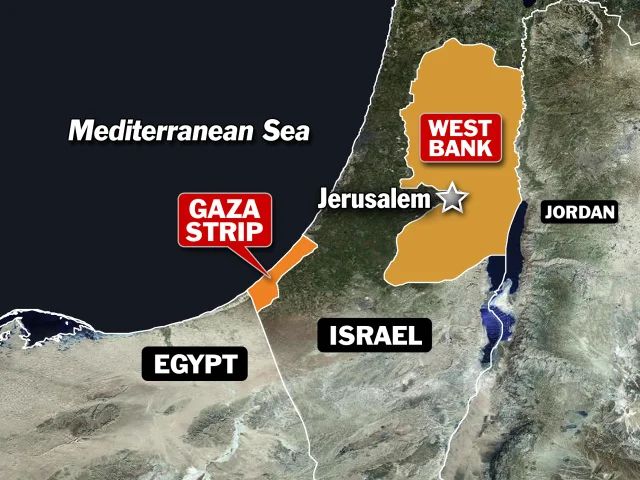
The Gaza Strip is teetering on the brink of a full-blown humanitarian disaster. Over nearly two years of conflict since October 2023, the lives of millions have been upended. In recent weeks, the situation has worsened, with mounting losses of life, collapsing infrastructure, and desperate shortages of food, water, medicine, and basic shelter. As diplomatic pressure builds, the eyes of the world are fixed on Gaza—both for its suffering and for what must be done now.
Recent Escalations & Key Events
-
Flotilla Interceptions: The Global Sumud Flotilla, involving around 42 vessels carrying activists, aid workers, and symbolic supplies—including high-profile figures like Greta Thunberg—attempted to breach Israel’s maritime blockade to deliver humanitarian aid. All its boats, including the final one, Marinette, were intercepted by the Israeli navy, and roughly 450 people detained.
-
Peace-Deal Ultimatum: U.S. President Donald Trump has issued a deadline (Sunday, 6 p.m. Washington time) for Hamas to accept a peace plan. The deal demands the release of 48 hostages, cessation of military operations, disarmament of Hamas, and international oversight of Gaza afterward, among other terms. If rejected, severe consequences are threatened.
-
On-Ground Devastation: Massive destruction has been reported across Gaza. According to the Financial Times, some 78% of buildings are damaged, agricultural land is largely unusable, and essential services are all but destroyed. Over 66,000 people are reported dead, with large scale displacement.
Humanitarian Crisis
Food, Water & Famine
-
Declared Famine: The Integrated Food Security Phase Classification (IPC) has escalated its warning—famine has officially taken hold in Gaza Governorate, with projections that it could spread further toward Deir al-Balah and Khan Younis. Millions are facing severe food insecurity.
-
Food supply breakdown: Kitchens, especially in northern Gaza, have shut down. One UN update noted that only eight kitchens remain operational, precipitating a 70% drop in cooked meal availability in that region.
-
Water crisis: Over one million people in Gaza are accessing less than six litres of drinking water per day—below the global emergency minimum. Many water and sanitation facilities are damaged or inaccessible.
Health, Displacement, and Infrastructure Collapse
-
Health systems overwhelmed: Many hospitals are out of commission or working at minimal capacity. Fuel shortages have crippled emergency services; even basic medical evacuations are difficult.
-
Mass displacement: Hundreds of thousands, possibly more, have been forced from their homes. Many are living in makeshift shelters or tents. School buildings, often doubling as shelters, have been destroyed or are unusable.
-
Infrastructure damage: Almost 80% of buildings in some reports have sustained damage. Hospitals, schools, water and electricity infrastructure have been severely degraded. Many basic services are non-functional.
Legal, Political & Moral Dimensions
-
Blockade & maritime law: The flotilla interceptions have sparked legal debates. Israel claims it is enforcing a legal blockade to prevent weapons smuggling, while critics argue humanitarian missions must be allowed safe passage under international law. The tensions between security concerns and human rights obligations are at the core.
-
Calls for ceasefire & peace: Many nations, international organizations, and NGOs are calling for an immediate and sustainable ceasefire. The U.S. peace plan ultimatum adds diplomatic weight, though there is concern over what terms are acceptable to all parties, especially in Gaza.
-
Allegations of war crimes and humanitarian law violations: Destruction of civilian infrastructure, targeting of hospitals and schools, and issues around starvation as a weapon of war have been raised by multiple UN bodies. There are also concerns about forced displacement and protection of civilians.
International Response
-
UN & NGOs: Agencies like OCHA, UNRWA, WHO have repeatedly warned that Gaza’s crisis is worsening “beyond imagination.” They continue to call for increased access for humanitarian relief, protection of civilians, and restoration of basic services.
-
Global Protests & Diplomacy: The flotilla has triggered protests across Europe and beyond. There’s growing diplomatic pressure on Israel to allow aid in, and on Hamas to consider ceasefire proposals. Governments are also scrutinizing the compliance with international law.
-
Aid constraints: Aid organizations are being stymied by physical and bureaucratic barriers. Supply chains are disrupted, crossings sometimes shut, movement of aid convoys is restricted. This is exacerbating the crisis.
Looking Ahead: What Must Happen
To avoid further catastrophe, several urgent actions are essential:
-
Immediate ceasefire — A durable ceasefire to halt further casualties and destruction is non-negotiable.
-
Unhindered humanitarian access — All crossings and routes must be opened for aid delivery; bureaucratic impediments removed. Prioritize water, food, medical supplies, fuel.
-
Protection of civilians and infrastructure — Ensure no attacks on hospitals, shelters, schools. Uphold international humanitarian law.
-
Clear, humane terms for peace negotiations — Any peace plan must prioritize lives, dignity, accountability. Hostage releases, safe zones, and governance frameworks must respect human rights.
-
International cooperation and oversight — Aid must be scaled up; reconstruction will require billions; global actors must coordinate responsibly.
Conclusion
Gaza is facing one of the worst humanitarian crises in modern times. With famine declared, the breakdown of essential services, massive displacement, and mounting civilian casualties, the people of Gaza are in desperate need. What happens in the next few days and weeks could shape their fate irrevocably.
The world must not look away. Diplomacy, urgency, compassion, and accountability are not optional—they are the only path forward to preventing more suffering.

You must be logged in to post a comment.